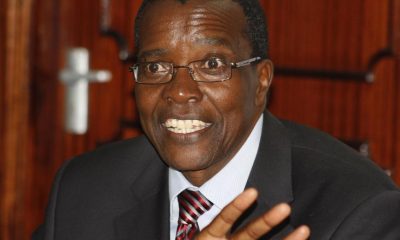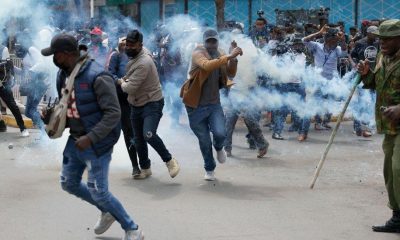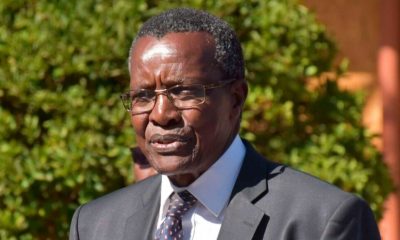Investigations
How Bribe From Roadblocks Is Shared In The Traffic Unit, Maraga Report Reveals The Rot In The Police Service
The roadblocks strewn across the country are bribe-taking stations with the report noting it’s the reason “there are as many as 42 roadblocks along the Mombasa-Busia highway.”
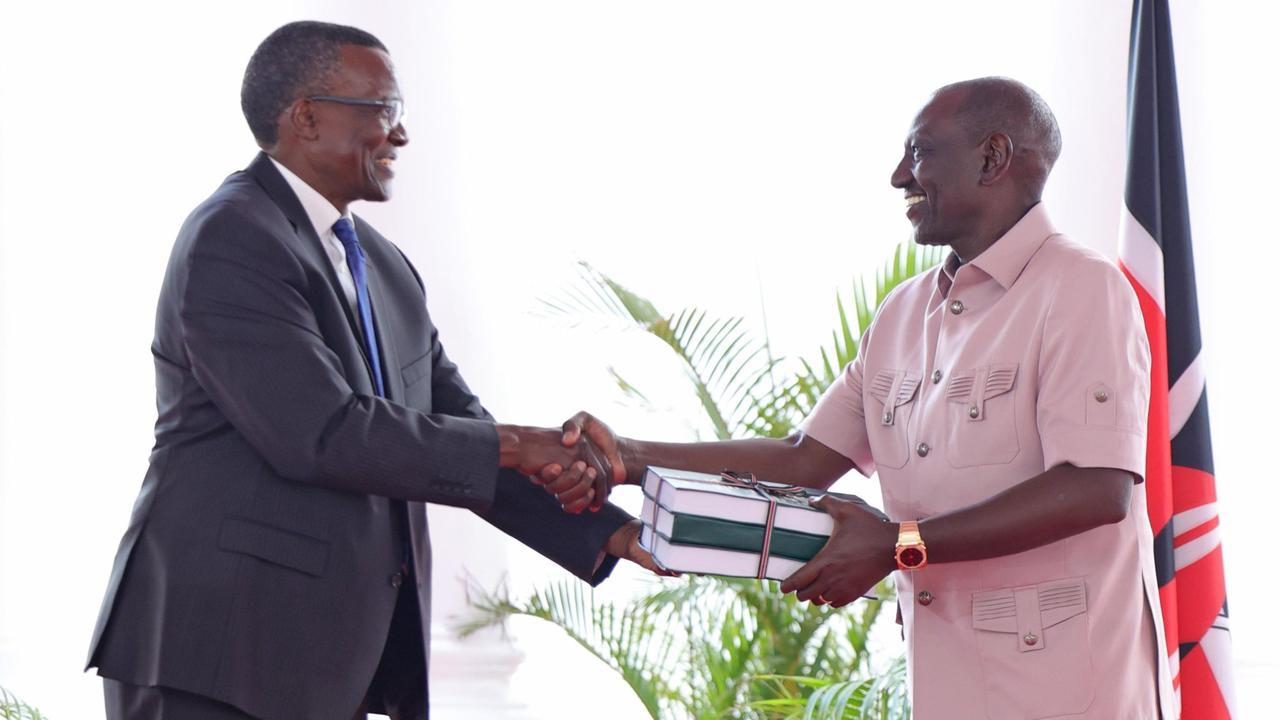
The runaway corruption in the National Police Service (NPS) including bribery in recruitment and how police chiefs pocket traffic bribes has been exposed in a report handed to President William Ruto, which also details Sh106 billion modernisation programme.
Far from the belief that merit and physical fitness guides police recruitment, the report reveals a slot is sold for Sh600,000, with those who have paid the bribes spared the rigorous exercises including road races.
Similar corruption extends to the recruitment of graduate cadets that only benefits children and relatives of the powerful including senior police officers, the kind of nepotism that ensures the leadership of the service is in the hands of the elite.
The report exposes how bribes collected from motorists by officers from the Traffic Police Unit are routinely shared high up the chain of command, with the competition for bribes blamed for countless road blocks, some erected within close proximity of each other.
So lucrative is the criminal enterprise that the report says in many cases, the station commander surrenders the official station vehicle, which is usually parked at the roadblock and used to aid in the collection of bribes instead of performing other priority duties.
These shocking details are contained in the report of the National Taskforce on Improvement of the Terms and Conditions of Service and other Reforms for Members of the National Police Service, Kenya Prisons Service and National Youth Service presented to the president on November, 2023.
Retired chief justice David Kenani Maraga chaired the 19-member task force whose full report has never been made public but which Nation obtained a copy.
The report recommends purchase of modern equipment like helicopters and weaponry as well as pay rise and upgrade of facilities in a Sh106 billion programme to boost the NPS.
Last week, President Ruto set in motion the implementation of the recommendations by the Maraga taskforce during a meeting at the Kenya School of Government where he announced Sh45 billion has been budgeted for the purchase of equipment.
Another Sh22 billion has been allocated to improve salaries and allowances of officers and Sh37 billion will go towards the upgrade of facilities including housing.
The report exposes the sorry state of the police air wing with revelations that 24 aircraft are unserviceable including five that had since crashed.
It lifts the lid on the clash between Kenya Defence Forces (KDF) and police chiefs after police air craft were transferred to the National Air Support Department (NASD), which is under KDF.
While KDF insists police were poorly managing the air craft, police chiefs counter in an analysis of the state of the air wing after transfer to NASD in “the period between 2010 to date, we saw a sharp decline in aircraft serviceability status.”
But it’s the shocking levels of corruption in the police service exposed in the report which details how bribes influence recruitment, deployment and promotions that highlight the rot that has only been portrayed in public perception studies.
And the task force cited confessions from within the ranks of NPS, which by last year consisted of 108,414 uniformed officers, according to the report.
“Police officers pointed out that internally, corruption deeply permeates various police processes such as transfers, promotions and even access by junior officers to some of the allowances. For instance, some officers never receive their transfer allowances even after reporting to their new stations. Some officers have been stuck in ‘forward’ or ‘operational’ areas for even up to 10 years while others never leave the comforts of urban areas and the so-called lucrative stations,” the report states.
“Corruption and nepotism in transfers and deployment have, in some cases, led to the posting of police officers to their communities where their work and objectivity are compromised,” it adds.
“The taskforce found very disgruntled officers who have been kept in hardship or operation areas, such as Garissa and Lamu, for more than 10 years. Female officers, it was added, are not equally distributed across the country but are, especially those who are willing to offer sexual favours, concentrated in urban areas,” the report states.
On recruitment, the taskforce received widespread complaints about “rampant bribery during selection exercises, with reports that slots are sold for up to Sh600,000 if not more.”
“Specifically, the criteria for elimination during recruitment is not known to members of the public. The Taskforce found that the public as well as officers are convinced that recruitment into NPS is a corrupt affair with little regard for merit and aptitude. The Taskforce shares in this conclusion and is of the view that this corruption has significantly eroded professionalism and service delivery,” says the report.
The recruitment of graduate cadets is similarly riddled with corruption that has left many serving officers disgruntled.
“Whereas these cadets are expected to be the future leadership of the Service, the taskforce heard that only the children and relatives of the powerful (including those of senior police officers) are picked through the cadet entry scheme, or as specialists, or civilian staff, thus undermining the vision of the Service,” the report states.
The Traffic Police Unit is identified as the citadel of graft and so lucrative is the unit that officers scramble and bribe their way to the unit. “Huge bribes are reportedly paid by officers who wish to be transferred to the Traffic department,” the report observes.
This brazen corruption is partly aided by the fact that the “Traffic Police has also, for a long time, remained a parallel unit outside of the control of ward and sub-county commanders.”
The roadblocks strewn across the country are bribe-taking stations with the report noting it’s the reason “there are as many as 42 roadblocks along the Mombasa-Busia highway.”
“In some regions, such as Busia, Taskforce members observed during the field visits that there was a police roadblock on the road after every 10 kilometres. It is also a matter of public notoriety that weighbridges across major roads are “toll stations” literally, with officers craving an opportunity to be deployed there,” the report observes.
At a typical police station, there is a separate Occurrence Book (OB) for traffic offences, which further blurs the lines of accountability at the station level.
“Members of the public informed the taskforce that police cash bail collected from motorists who are bonded on the roads to appear in court are hardly refunded even after conclusion of their matters,” the report adds.
“The Traffic Police have lost credibility in the eyes of the public,” the report says, citing instances during the police vetting exercise that exposed traffic police officers with large sums of money in their bank accounts and mobile money.
Despite this rampant corruption, the task force noted that rogue police officers are never held to account because of an elaborate cover-up.
“It is also significant that despite the reported cases of corruption in this unit, not a single officer has been dismissed from the Service for engaging in bribery on the roads. This very fact points to leadership failure or possible complicity of the NPS leadership in this vice,” the report says. Independent Police Oversight Authority, according to the report, noted that it has “encountered hostility and resistance from all the levels of the NPS whenever it attempts to investigate corruption in the Service.”
The task force recommends that the Deputy Inspector General, the Kenya Police Service, should disband the current Traffic Unit, and reconstitute a Traffic Control Unit that will operate on the basis of integrated and automated intelligent traffic control system.
“All officers under the current Traffic Police Unit, and those who have previously served under the Unit should not be redeployed to the new Traffic Control Unit or any other traffic management duties or functions,” the report recommends.
To reform the service, the report recommends the minimum grade for recruitment into NPS should be raised from D+ to C- in Kenya Certificate of Secondary Education (KCSE) or its equivalent.
“Following the views received, the taskforce is of the view that the current minimum requirement of KCSE grade D+ for recruitment as a constable in the NPS is way too low. The complex security needs and the sophistication of today’s criminals require a Service that is highly skilled, competent and professional,” the report observes.
The task force also recommends that the minimum recruitment age should be raised from 18 to 21 years to ensure recruits are mature.
The duration of the initial training for constables that takes nine months should be extended to not be less than 12 months and that for cadets should take not less than 15 months, the report recommends.
This will facilitate relevant theoretical and practical training to ensure competency and professionalism.
The taskforce has recommended the reversal of the merger between the Administration Police Service and Kenya Police Service. It directs the National Police Service Commission (NPSC) and the Inspector General “to take appropriate remedial measures including the redeployment of the over 24,572 APs who were integrated into KPS.”
The Maraga report, which the president has announced will guide the reforms in the three services- AP, KP and Prisons- has outlined the measures that need to be implemented.
Among the priority issues in the NPS are enhanced medical cover for all police officers, addressing mental health, and improving the salaries and allowances of officers.
NPSC had proposed an increase in the basic salary of a police constable by 79 per cent from Sh20,390 to Sh36,450 to compensate for the long period police officers have stagnated without a review of their basic salary. The IG and senior officers proposed a 180 per cent rise in basic salary.
Police officers have secured a modest pay rise whose implementation started in July.
Fresh recruits into the police service will now get a Sh4,000 pay rise while the highest increment of Sh21,000 will benefit senior officials in the rank of senior Assistant Inspector General.
The taskforce recommends that the Salaries and Remuneration Commission should establish a system of remuneration for disciplined services completely delinked from the civil service job groups classification system and pay determination.
The audit by the taskforce revealed that operations of the police were hard hit due to underfunding of the NPS.
On prisons reforms, the taskforce noted that corruption was choking the department to the extent that graft was one of the parameters that now defines operations there.
The Maraga team noted that promotions and appointments into the top leadership in the prisons service are influenced by political patronage.
The same case applies to the National Police Service where corruption in the service is so rampant to the point of guiding the police operations.
The taskforce has asked President Ruto to consider negotiating with the current NPSC commissioners to leave office ahead of their time to give way for the recruitment of a new team.
“It (NPSC) has also generally been unable to develop policies and institute measures that would enable it to perform its constitutional and statutory obligations. In the circumstances, the taskforce has been left with no option but to recommend that government considers initiating a negotiated exit, or any other legally recognised modality, for the current Commissioners of NPSC, “the report states.
Interior Cabinet Secretary Kithure Kindiki has been appointed by the president to oversee the reforms.
Prof Kindiki will lead the National Inter-Agency Steering Committee that is responsible for implementation of the reforms.
Senior officials from the Ministry of Public Service, the National Treasury, Salaries and Remuneration Commission and the National Police Service Commission have been seconded to this committee.
Others officials in the team include officers drawn from IPOA, Public Service Commission, National Youth Service Council, the Judiciary and the Ethics and Anti-Corruption Commission.
Kenya Insights allows guest blogging, if you want to be published on Kenya’s most authoritative and accurate blog, have an expose, news TIPS, story angles, human interest stories, drop us an email on [email protected] or via Telegram
-
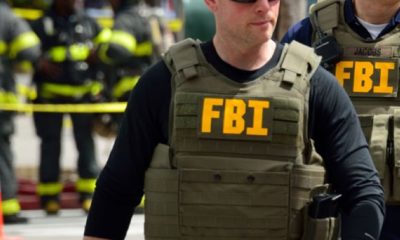
 Investigations2 weeks ago
Investigations2 weeks agoInside Nairobi Firm Used To Launder Millions From Minnesota Sh39 Billion Fraud
-

 News2 weeks ago
News2 weeks agoPastor James Irungu Collapses After 79 Hours Into 80-Hour Tree-Hugging Challenge, Rushed to Hospital
-

 Business2 weeks ago
Business2 weeks agoMost Safaricom Customers Feel They’re Being Conned By Their Billing System
-

 News2 weeks ago
News2 weeks agoUnfit for Office: The Damning Case Against NCA Boss Maurice Akech as Bodies Pile Up
-

 News2 weeks ago
News2 weeks agoTax Payers Could Lose Millions in KWS Sh710 Insurance Tender Scam As Rot in The Agency Gets Exposed Further
-

 News2 weeks ago
News2 weeks agoDeath Traps: Nairobi Sitting on a Time Bomb as 85 Per Cent of Buildings Risk Collapse
-

 News2 weeks ago
News2 weeks agoRaila Bodyguard Maurice Ogeta Appointed As Mombasa Security County Adviser
-

 Investigations6 days ago
Investigations6 days agoKERRA Homa Bay Region Manager Calvince Thomas Accused of Swindling Businessman Ksh 2 Million in Phantom Tender Deal



